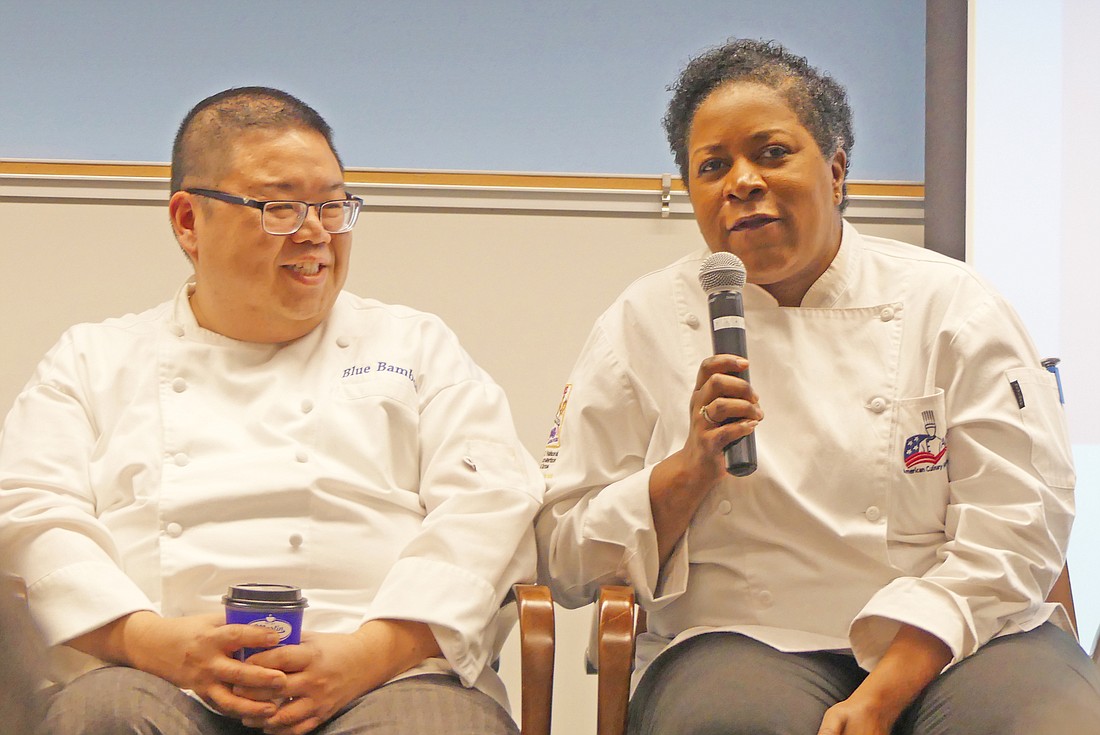
North Florida’s restaurant scene has expanded far beyond “having a barbecue restaurant on every corner” 10 years ago, with diners now willing to try new things.
The breadth and diversity of North Florida’s changing culinary landscape and trends in the restaurant business were the topics Monday at the Florida State College at Jacksonville Business Speaker Series, presented by First Florida Credit Union, at FSCJ’s Advanced Technology Center on the Downtown campus.
The panel comprised Dennis Chan, chef and owner of Blue Bamboo restaurant; Ben Johnson, president of Martin Coffee Co.; Celestia Mobley, executive chef at Celestia’s Coastal Cuisine and the new Jazzy’s Restaurant & Lounge; Lauren Titus, editor of Edible Northeast Florida magazine; and Jerry Watterson, founder of the Jax Restaurant Reviews food blog.
The discussion was moderated by Renee Brust, marketing and communications director at the American Culinary Federation, an association of professional chefs.
Watterson said chefs are taking chances, offering cuisine options that weren’t previously available.
That’s because Jacksonville residents are becoming “traveled,” Chan said. “They get out there and see different things.”
Titus said social media also gives diners the opportunity to discover new restaurants or restaurants they have not patronized.
The trend toward culinary diversity also has affected Johnson’s wholesale coffee company.
“When I started in the business 20 years ago, we had two types-regular and decaf. Now, we have 16 coffees. People are more knowledgeable and they know their personal tastes,” he said.
Based on the federation’s annual survey of about 15,000 professional chefs, Brust said, the definition of “ethnic food” has changed.
Italian, Latin and Asian cuisine have become mainstream and “ethnic” is now reserved for cuisine from the Philippines or North African countries, for example.
Operating restaurants with zero waste is an emerging trend in the industry.
It can include eliminating plastic straws and reducing the of other plastics, such as styrofoam, in packaging take-out meals.
“It’s a request from consumers and restaurants can save money when the goal is zero waste,” Titus said.
Another trend that’s taken hold in Jacksonville is the “fast casual,” restaurant concept. Customers place their order at a counter and then seat themselves. Their order may be picked up at the counter or brought to the table by wait staff.
While it’s a different style of service, Mobley, a graduate of the FSCJ culinary arts program, said the quality of the food and how it’s prepared is more like a full-service restaurant.
“It’s still cooked to order, so it’s not always fast, but it’s real food. It’s a step up from fast food,” she said.
The panel also considered the question of how much restaurant workers should be paid. Based on the cost of living, the minimum wage and a 40-hour week won’t cover the cost of the most basic expenses.
“I would love to pay my employees $12 an hour and up, but I would go out of business,” Mobley said.
And raising menu prices to cover increased payroll isn’t an option.
“Consumers in Jacksonville are not ready for fried chicken to be $20,” she said.
While a career in cuisine probably won't lead to personal wealth, Brust said apprenticeship programs are not experiencing a shortage of applicants.
Chan said mentorship is part of his business.
“As a chef, the best compliment you can get is for people who worked for you to succeed on their own,” he said.
The Business Speaker Series will continue April 8 when “Gamechangers: Disruptors in Various Industries” will be presented at 6:30 p.m. at the Nathan H. Wilson Center for the Arts on FSCJ’s South Campus.
Visit fscj.edu/business-speakers for details.